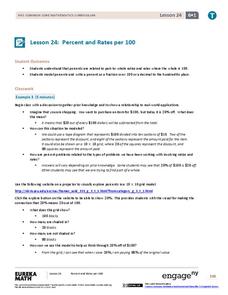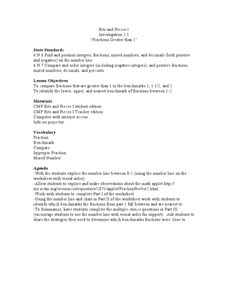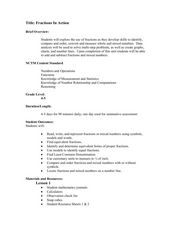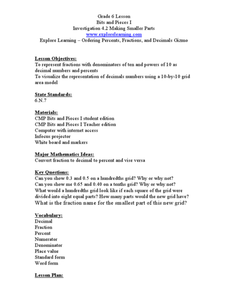Curated OER
Comparing Fractions
Young mathematicians compare two fractions with like denominators and then move to the next level to compare fractions with unlike denominators. They will first try to use mental math to make educated guesses. There are a few guidelines...
Curated OER
Rule for Equality of Fractions
Here is a lesson on equality of fractions. Learners use fraction bar manipulatives as the lesson goes along to help them visually understand equivalent fractions. The activities described are top-notch, and there is a worksheet embedded...
EngageNY
Percent and Rates per 100
What percentage of your class understands percents? Pupils learn the meaning of percents based upon rates per 100 in the 24th activity in a series of 29. They represent percents as fractions, decimals, ratios, and models. The scholars...
Yummy Math
Valentine’s Day = Roses
Roses are red, but did you know that some are lighter while others are darker? Scholars read an infographic to decipher the fraction and percent of rose color and their country of origin. They go on to make comparisons and estimate while...
Florida International University
Counting FishStix
How do we count the fish in the ocean? An engaging lesson models how to estimate fish populations with observational surveys. Class members begin by studying the behavior of fish on the coral reef in the oceans. They...
EngageNY
The Most Famous Ratio of All
Pupils develop a definition of a circle based upon its radius in the 17th segment of a 28-part series. They determine the relationship between the radius and the diameter of a circle. To round out the lesson, they use the formula for the...
Curated OER
Talking Rocks
Artists imitate the symbols used by tribes of the Southwest or use their own word pictures that communicate something about themselves. This lesson is a perfect blend of visual art and social studies. Students create a beautiful piece of...
Curated OER
Best lesson in the whole world!
Students study the concept of fraction using mathematical reasoning. For this problem solving fraction lesson, students use various methods to explain their reasoning in solving fractions. Students use a number of different prompts to...
Curated OER
Bits and Pieces: Fractions Greater Than One
Learners compare fractions. In this fraction worksheet, students examine the number line. Using the Internet, they explore models of numbers greater than one. Learners complete multiple-choice worksheets.
Curated OER
Four-Legged Creatures In Amaco Cloud Clay
Students create a creature using Amaco cloud clay. In this sculpting lesson, students use clay, toothpicks, and clay modeling tools to create a unique clay creature. Students shape the clay into a four-legged animal.
Curated OER
Scale Basketball
Students understand that a spreadsheet can be used to find the best scale to use in a model. They place the distances of the planets of the solar system to the Sun in one column of the spreadsheet. Students try different scales so that...
Curated OER
Fraction Card Shark
Second graders explain the relative size of fractions using symbolic and concrete representations. Groups of four students play a game which uses cards and unifix cubes. The game helps them get a visual understanding for the 'size' of...
Curated OER
Fractions in Action
Investigate equivalent fractions with your class. They compare and order fractions. Then they work cooperatively in groups to experiment and problem solve with fractions using a game format. Multiple resources are provided.
Curated OER
Fun Food Faces
Students create tasty faces. In this food lesson, students use rice cakes to make a funny face. Students follow directions and use creativity for this activity. Students make a list of things they need from the grocery store to make more...
CK-12 Foundation
Conditional Probability: Colorful Cubes
An interactive provides a model to visually represent the formula for the probability of an outcome. Given 10 numbered color cubes, pupils arrange them on the top and bottom shelf to represent the probability fraction. The learners...
Curated OER
Adding and Subtracting Fractions and Mixed Numbers
Elementary schoolers participate with their teacher's instruction to learn to add and subtract fractions and mixed numbers. They use fraction strips to complete addition and subtraction problems. A step-by-step script is provided to help...
Curated OER
Understanding Visual Fractions
These shapes give scholars an excellent chance to see numerators and denominators in a visual way. They examine segmented shapes with portions colored in, determining what fraction the shaded section represents. For some problems, there...
Curated OER
Origami Ducks: Geometry, Listening, and Following Directions
Make origami ducks with your class to reinforce geometry concepts and vocabulary; develop fine motor and visual translation skills; and enrich study of Japanese culture, the pond habitat, or migration. Create a whole group "worksheet"...
Curated OER
Fractions
First graders create fraction creatures by using 1 inch squares of construction paper. In this fractions lesson plan, 1st graders name the fractions within their whole creatures.
EngageNY
Exploiting the Connection to Trigonometry 2
The class checks to see if the formula for finding powers of a complex number works to find the roots too. Pupils review the previous day's work and graph on the polar grid. The discussion leads the class to think about...
Curated OER
Bits and Pieces I
Sixth graders examine making smaller parts out of fractions and decimals. For this online interactive fractions, decimals, and percents lesson, 6th graders represent fractions with denominators of ten. Students then represent powers of...
Curated OER
Computation with Fractions
Upper graders are introduced to the topic of fractions and percentages. In groups, they discuss real world situations in which fractions are present, and they complete a worksheet solving problems with common and uncommon denominators....
Curated OER
Scale Basketball
Young scholars discuss scale diagrams and maps as well as the use of spreadsheets to find the best scale to use in a model before practicing scale and ratio problems on their own.























